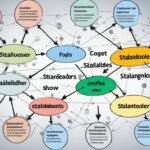Table of Contents
A helpdesk is a centralized platform that provides support, information, and solutions to customers, employees, or both. It acts as a single point of contact, streamlining the communication process between users and support teams. Helpdesks can be physical or virtual, and they often employ advanced technologies like artificial intelligence (AI) to provide quick, accurate, and efficient assistance.
Helpdesks contribute to the enhancement of customer satisfaction, employee productivity, and overall operational efficiency. They serve as a centralized platform for managing customer or employee inquiries, reducing the time spent on resolving problems, and ensuring a seamless support experience. When customers receive timely and effective support, their satisfaction levels increase, leading to long-term loyalty and a positive brand image.
Additionally, helpdesks offer built-in analytics and reporting capabilities, providing valuable data on user inquiries and support interactions. This data can be used to identify trends, make informed decisions, and improve the support process, ultimately leading to an enhanced user experience.
Types of Help Desks and Their Purposes
There are different types of help desks designed to cater to different needs and requirements. Let’s explore some of the main types:
Internal Help Desk
An internal help desk is designed to support the employees within an organization. It focuses on addressing technical issues, providing software support, and troubleshooting hardware problems. Examples of internal help desks include:
- IT Help Desk
- HR Help Desk
- Facilities Help Desk
External Help Desk
An external help desk is dedicated to assisting customers who are facing issues or have queries about a company’s products or services. It plays a crucial role in enhancing customer satisfaction and is often available through various channels such as phone, email, live chat, and social media. Examples of external help desks include:
- Customer Support
- Business Operations Support
- Vendor or Partner Support
Outsourced Help Desk
An outsourced help desk involves delegating support operations to a third-party service provider. This allows businesses to tap into specialized skills and knowledge without building an in-house team. Outsourced help desks are particularly beneficial when businesses require external assistance and expertise.
Hybrid Help Desk
A hybrid help desk combines elements of both internal and external help desks. It can be an ideal solution for businesses that want to maintain a certain level of in-house support while also benefiting from external assistance. This model offers flexibility and the ability to leverage the expertise of both internal and external resources.
Each type of help desk serves a unique purpose and plays a vital role in ensuring efficient and effective support for employees and customers alike.
Key Roles in a Help Desk Team
A help desk team consists of several key roles that are essential for ensuring efficient support operations and delivering exceptional customer service. Let’s take a closer look at each role:
Help Desk Manager
The help desk manager plays a crucial role in overseeing the overall functioning of the help desk. They are responsible for configuring and managing the help desk processes, workflows, and tools required for the team to deliver a great customer experience. As subject matter experts, they ensure that service level agreements are met, and they continuously optimize the help desk operation to enhance customer satisfaction.
Support Manager
The support manager provides supervision and guidance to a team of support agents. They are responsible for ensuring that work is distributed appropriately among the team members, effectively utilizing their skills and expertise. By closely monitoring the team’s performance, support managers ensure that customers receive prompt and efficient support. They also play a vital role in training and developing support agents to enhance their skills and maintain a high level of customer satisfaction.
Support Agent
Support agents are the frontline of the help desk team, responsible for responding to customer support requests and resolving issues on behalf of the business. They possess core skills in areas such as IT support, technical support, or business operations support, depending on the specific requirements of the help desk. Support agents engage with customers in a friendly and professional manner, utilizing their expertise and problem-solving abilities to address customer inquiries and provide effective solutions.
“Being a support agent requires excellent communication skills and a deep understanding of the products or services the business offers. It is their responsibility to ensure that customers receive the assistance they need, resolving their issues promptly and with the utmost care.”
If a support agent encounters a complex issue beyond their expertise, they escalate the request to a support manager or another specialized support agent who can provide the necessary assistance. This collaborative approach ensures that customers receive comprehensive support and that their issues are resolved efficiently.
The roles within a help desk team work together harmoniously, combining their expertise and skills to deliver exceptional customer support and maintain high levels of customer satisfaction.
| Role | Description |
|---|---|
| Help Desk Manager | Responsible for configuring and managing help desk processes, workflows, and tools. |
| Support Manager | Supervises the support agents, ensuring work is distributed proportionately and efficient support is provided. |
| Support Agent | Responds to customer inquiries and helps resolve issues, possessing core skills in IT, technical support, or business operations. |

Features and Benefits of Help Desk Software
Help desk software is a powerful tool for businesses, providing a centralized hub to manage all support requests efficiently. With a ticketing system, businesses can prioritize and organize conversations, ensuring timely resolutions to every issue. Moreover, by offering self-service capabilities, users can find answers themselves, reducing reliance on busy support agents and empowering customers to take control of their own support needs.
One of the advantages of help desk software is the robust analytics and reporting features it offers. Businesses gain valuable insights into support interactions and user inquiries, enabling data-driven decision-making to improve and optimize the support process. Additionally, help desk software provides integrations, allowing businesses to enhance their support capabilities by seamlessly integrating with other apps and tools that align with their specific needs.
With help desk software, businesses can provide personalized service to their users, resulting in exceptional customer experiences. An issue tracking system enables efficient tracking and resolution of issues, guaranteeing that no problem falls through the cracks. By streamlining support operations and offering a centralized hub, help desk software contributes to increased efficiency, reduced response times, and ultimately, improved customer satisfaction.
FAQ
What is a help desk?
A help desk is a centralized platform that provides support, information, and solutions to customers, employees, or both. It acts as a single point of contact, streamlining the communication process between users and support teams.
How do help desks enhance operational efficiency?
Help desks contribute to the enhancement of customer satisfaction, employee productivity, and overall operational efficiency. They serve as a centralized platform for managing customer or employee inquiries, reduce the time spent on resolving problems, and ensure a seamless support experience.
How do help desks improve customer satisfaction?
When customers receive timely, effective support, their satisfaction levels increase, leading to long-term loyalty and a positive brand image.
What types of help desks are there?
There are different types of help desks designed to cater to different needs and requirements. These include internal help desks (IT, HR, facilities), external help desks (customer support, business operations, vendor or partner support), outsourced help desks, and hybrid help desks.
What are the key roles in a help desk team?
A help desk team consists of several key roles, including the help desk manager, support managers, and support agents. Help desk managers configure and manage the help desk processes and workflows, support managers supervise the team of support agents, and support agents respond to customer support requests and help resolve them on behalf of the business.
What is help desk software?
Help desk software is a tool that helps a business collate all support requests in a single place and allows the team to respond to each issue in an organized and timely fashion.
What features does help desk software typically include?
Help desk software typically includes a ticketing system, self-service capabilities, analytics and reporting tools, and integrations with other apps and tools.
What are the benefits of using help desk software?
By utilizing help desk software, businesses can create a centralized hub for support, provide personalized service to users, track and resolve issues efficiently, and gain valuable insights to improve their support processes.












